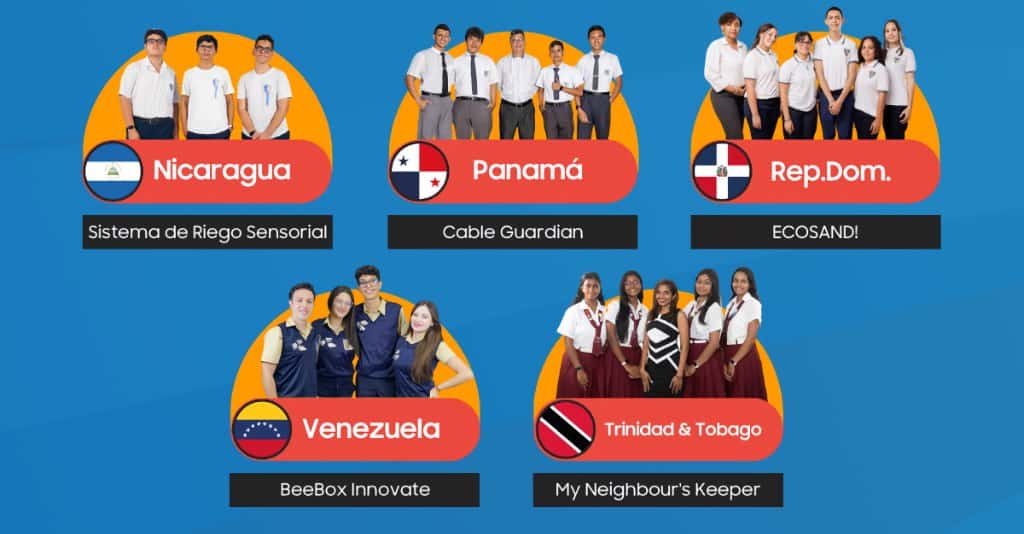
Above: Five of the 11 winning country teams. Image courtesy Samsung.
Samsung’s Solve for Tomorrow programme is close to the grand finale. For the 11th edition of the regional competition, participants from 11 countries in Central America, the Caribbean, Ecuador, and Venezuela, the teams submitted projects that reflected a social focus and a connection with the realities of their communities to create impactful solutions.
From each country, one champion was selected. In Trinidad and Tobago, the team from Holy Faith Convent Penal was chosen as the winner. The team consisted of students Aneesa Ali, Kareena Sohun, Kajal Sankar, and Shana Lochan, along with their teacher Reshma Persad, who presented the project called “My Neighbour’s Keeper”.
“My Neighbour’s Keeper” suggests an app that helps reduce crime in Trinidad and Tobago through community alerts. Using a specific code for each community, residents can register and update the location of their homes and send immediate alerts about incidents like burglaries, fires, or strangers in the area, promoting mutual protection and quick communication with authorities.
“We are extremely pleased that this year, students, supported by their teachers, presented ideas and prototypes focused on solving problems increasingly inherent to the needs of their communities, with a clear motivation for collective well-being,” said María Fernanda Hernández, Corporate Citizenship Manager at Samsung.
In addition to the country winners, the three finalists were selected to compete for the grand prize. The three finalists are from Belize, Costa Rica, and Panama. The students from these three countries competed against 12,800 students registered in Samsung’s annual programme. With talent, effort, teamwork, and lots of study, combined with the training provided by Samsung Electronics and its partners, these three teams have proudly stood out and are now part of the decisive stage of this successful educational programme.
Hernández said the initial support provided to schools in these 11 countries (Belize, Costa Rica, Ecuador, El Salvador, Guatemala, Honduras, Nicaragua, Panama, the Dominican Republic, Trinidad & Tobago, and Venezuela) was crucial in motivating and helping them formulate their projects for participation, through Design Thinking workshops, in which Samsung employee volunteers participated as part of the mentoring group.
“The initial result was very gratifying: 12,821 students and teachers registered; a 45 per cent increase compared to the 2023 edition of the program. Then the semifinalist teams received training based on STEM sciences (Science, Technology, Engineering, and Mathematics), which included problem-solving strategies, team management, critical and creative thinking, as well as the Lean Canvas and Pitch tools,” she added.
Regional winner and online winner
After thorough evaluations by the jury, the teams from Belize, Costa Rica, and Panama were selected for their outstanding projects, while also recognizing the high value of the ideas developed by the other eight teams. The grand winner will be announced at the regional event to be held in Guatemala, where the three finalist teams will be present.
As in previous editions, in addition to the grand final winner among the three competing teams, SFT 2024 will also award the title of Virtual Community Champion. This winner will be decided by votes from online users who visit the Solve for Tomorrow Latin platform on YouTube. On this channel, the 11 videos from each of the country teams are available, where the young participants explain and promote the strengths of their projects.
It’s very easy to vote for a team. Go to the SFT Latin account (https://www.youtube.com/@solvefortomorrowlatin), access the “Semifinalists Solve for Tomorrow 2024” section, click on one of the videos to watch it, then click “Like” to cast your vote, and even share it with others to help that team gather more votes.


[…] Trinidad and Tobago – Samsung’s Solve for Tomorrow programme is close to the grand finale. For the 11th edition of the regional competition, participants from 11 countries in Central America, the Caribbean, Ecuador, and Venezuela, the teams submitted projects that reflected a social focus and a connection with the realities of their communities to create impactful solutions… more […]